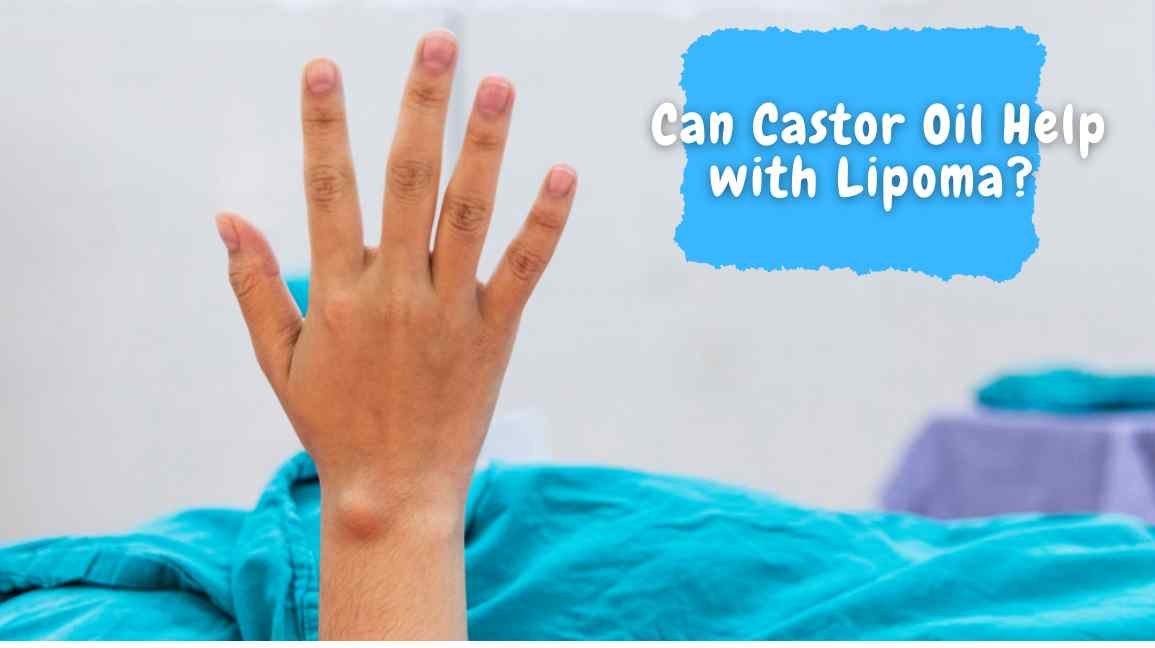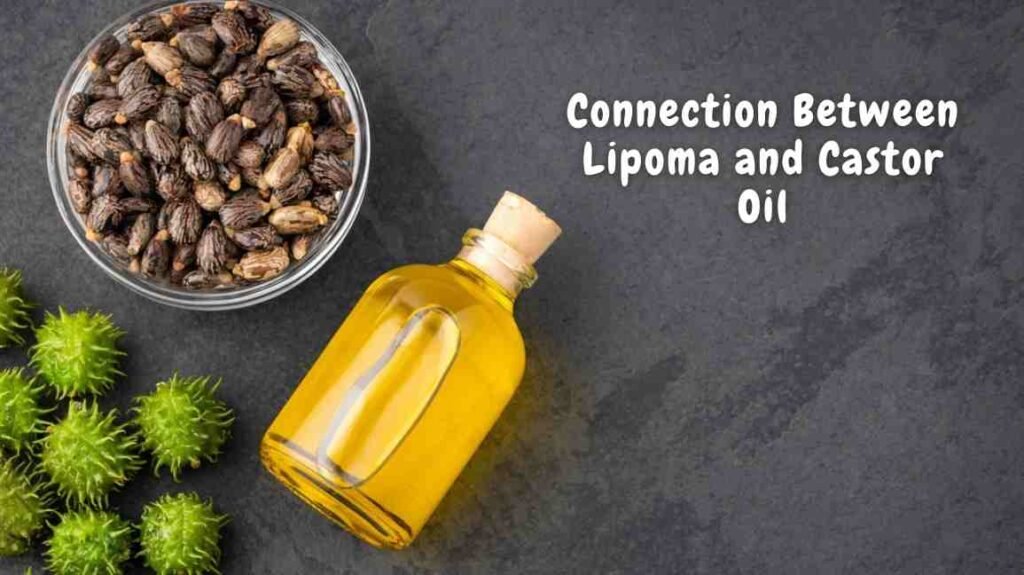
Lipomas are benign tumors composed of fatty tissue that can appear anywhere on the body. They are generally harmless but they can cause discomfort or cosmetic concerns for those who have them.
Traditional treatment options often involve surgical removal, which can be invasive and costly. As a result, many people are exploring natural remedies like castor oil, to alleviate or reduce the appearance of lipomas.
In today’s article, we discuss whether castor oil can be an effective natural remedy for lipomas. We will explore the properties of castor oil, how it is believed to work, and review any scientific evidence supporting its efficacy.
What is Lipoma and What Causes It?
Lipomas are soft, rubbery lumps that move easily under the skin when pressed. They are composed of adipocytes—mature fat cells—and are usually slow-growing.
The exact cause of lipomas is not clear, but genetics seem to be important. Lipomas often run in families which means they can be hereditary. Some conditions like Gardner’s Syndrome and adiposis dolorosa are linked with getting multiple lipomas.
Although lipomas can develop at any age, they are most commonly diagnosed in middle-aged adults. They tend to grow larger with time but remain benign, rarely turning into malignant liposarcomas.
Symptoms of Lipomas
Lipomas are usually painless and don’t cause health problems. But some people might feel discomfort if the lipoma presses on a nerve or if it’s in a spot that gets rubbed by clothing or movement.
Other symptoms may include:
- Soft, rubbery, easily movable lump under the skin
- Slow growth over time
- Multiple lumps appearing in different areas of the body
- Lipomas can range in size from very small to several inches in diameter.
- Lipomas can appear on any part of the body, but most often occur on the torso, arms, or thighs.
Common Causes of Lipomas
Experts are still unsure about the exact cause of lipomas. However, some factors that may contribute to their development include:
- Age: Lipomas are most commonly diagnosed in middle-aged adults like those in their 40s and 50s.
- Genetics: Lipomas can run in families and be hereditary.
- Adiposis Dolorosa: This is a rare condition that causes multiple lipomas to form which usually on the torso and limbs.
- Gardner’s Syndrome: A genetic disorder that increases the risk of developing multiple lipomas, along with other growths, tumors, and polyps.
Understanding Castor Oil and Its Uses
Castor oil is a vegetable oil derived from the seeds of the castor bean plant (Ricinus communis). It has been used for centuries in traditional medicine for its healing properties.
The oil is rich in ricinoleic acid, a fatty acid believed to have anti-inflammatory and analgesic effects. Castor oil is commonly utilized for skin conditions, hair growth enhancement, and as a laxative due to its ability to stimulate bowel movements.
What is Castor Oil Used For?
It is frequently used in skin care to moisturize dry skin, reduce inflammation, and treat minor cuts and abrasions. Research shows that it has antimicrobial properties that make it effective for treating fungal infections.
In hair care, castor oil is praised for promoting hair growth and improving scalp health. Moreover, due to its laxative properties, it is sometimes used to relieve constipation. The oil’s versatility and natural origin make it a popular choice in various home remedies.
Connection Between Lipoma and Castor Oil

The use of castor oil for lipomas is based on its anti-inflammatory and fat-dissolving properties. Some believe that applying castor oil to a lipoma can reduce its size, shrink it, or even eliminate it over time. However, it’s important to understand what science says about this claim.
Does Castor Oil Really Help Treat Lipoma?
No, there’s no solid proof that castor oil can treat lipomas. Even though castor oil is known for reducing inflammation and possibly breaking down fat, there’s not enough scientific evidence to show it works on lipomas.
Anecdotal reports suggest some people have experienced a reduction in the size of their lipomas after consistent application of castor oil. However, more clinical research is needed to substantiate these claims and determine the safety and efficacy of using castor oil for lipomas.
RELATED: Amazing Benefits of Applying Castor Oil on Feet at Night
What Research Says
Many people say castor oil helps with lipomas, but scientists haven’t proven it works yet.
A few minor studies have investigated the potential benefits of castor oil for skin conditions and inflammation, suggesting that its anti-inflammatory properties could theoretically be beneficial.
However, these studies do not specifically address lipomas. Therefore, while castor oil may offer some relief or reduction in lipoma size for some individuals, it should not be relied upon as a definitive treatment.
Are there any side effects if i use it for lipoma?
Using castor oil for lipomas is usually safe for most people when applied to the skin. However, castor oil doesn’t really penetrate deep enough to reach where lipomas are. So, it’s unlikely to have much effect on them.
However, some people may experience skin irritation, redness, or allergic reactions. It is always advisable to perform a patch test before applying castor oil over a larger area. If you experience any negative effects, discontinue use immediately and consult a healthcare professional.
Tips for Using Castor Oil for Lipoma
If you still wish to try using castor oil for lipoma, here are some tips to maximize its potential benefits:
- Choose Pure Castor Oil: Ensure you are using 100% pure, cold-pressed castor oil. This type of oil retains more of its natural nutrients and properties.
- Conduct a Patch Test: Before applying castor oil on larger areas, perform a patch test to check for any allergic reactions or skin sensitivity.
- Clean the Area: Wash and dry the area around the lipoma thoroughly to remove any dirt or oils that might hinder the penetration of castor oil.
- Warm the Oil: Slightly warm the castor oil before application. Warm oil can be more soothing and may absorb better into the skin.
- Use a Cotton Ball: Soak a cotton ball in warmed castor oil and apply it directly to the lipoma.
- Cover with a Bandage: For better absorption, cover the area with a bandage or clean cloth. This can help keep the oil in place and prevent it from rubbing off onto clothing.
- Repeat Consistently: Apply castor oil to the lipoma at least once a day, preferably at night, to allow for more prolonged contact.
- Consult a Doctor: If the lipoma changes in size, shape, or becomes painful, seek medical advice. It’s crucial to rule out any underlying health issues.
By following these tips, you might improve the effectiveness of castor oil application. But remember, castor oil is not a proven medical treatment for lipomas. You should talk to a doctor first.
Safer Alternatives to Castor Oil for Lipoma
People often talk about using castor oil to treat lipomas, but there are better medical treatments that work more effectively. Doctors usually suggest these treatments based on how big the lipoma is, where it is located, and what symptoms it causes.
- Surgical Removal: This is the most common and effective treatment for lipomas. A surgeon makes a small incision in the skin to remove the lipoma. This procedure is typically quick and can often be done on an outpatient basis.
- Liposuction: Liposuction involves using a needle and a large syringe to remove the fatty lump. This method is less invasive than traditional surgery and may be preferable for larger lipomas or those located in sensitive areas.
- Steroid Injections: In some cases, injections of steroids into the lipoma can help shrink it, although this method may not remove the lipoma completely.
- Laser Treatment: Newer methods involving laser therapy are being explored for their potential to break down fat tissues effectively and with minimal scarring.
- Natural Alternatives: While not medically proven for lipomas, some people find that maintaining a healthy diet and engaging in regular exercise can help manage the condition whic potentially slows the growth of lipomas.
Conclusion
While castor oil is praised for its anti-inflammatory and fat-dissolving properties, its effectiveness in treating lipomas remains unproven by scientific research.
Those seeking treatment should consider safer, more reliable medical options like surgical removal, liposuction, or steroid injections. Consulting with a professional is essential to determine the most appropriate treatment for individual cases.
FAQ
Can I ingest Castor Oil to treat Lipomas?
No, ingesting castor oil is not effective in treating lipomas and can be unsafe. Oral consumption of castor oil is mainly used as a laxative and may cause side effects like abdominal cramps, diarrhea, and dehydration.
Can I use castor oil in combination with other treatments?
Using castor oil in combination with other treatments is generally not recommended, as its effectiveness for lipomas has not been scientifically proven. Combining it with other medical treatments like surgical removal or steroid injections could complicate the overall treatment plan. It’s best to discuss with a doctor before combining treatments.
Are there any other benefits of castor oil for skin?
Yes, castor oil is known for its various skin benefits. It possesses moisturizing properties due to its high ricinoleic acid content which makes it effective in hydrating dry skin. Moreover, it has anti-inflammatory and antimicrobial properties, which can help soothe irritated skin, reduce acne, and promote healing of minor cuts.
Resources
- WebMD. Castor oil Uses & Side effects
- MayoClinic. Lipoma – Symptoms & causes
- Healthdirect. Lipoma – Treatment & Symptoms